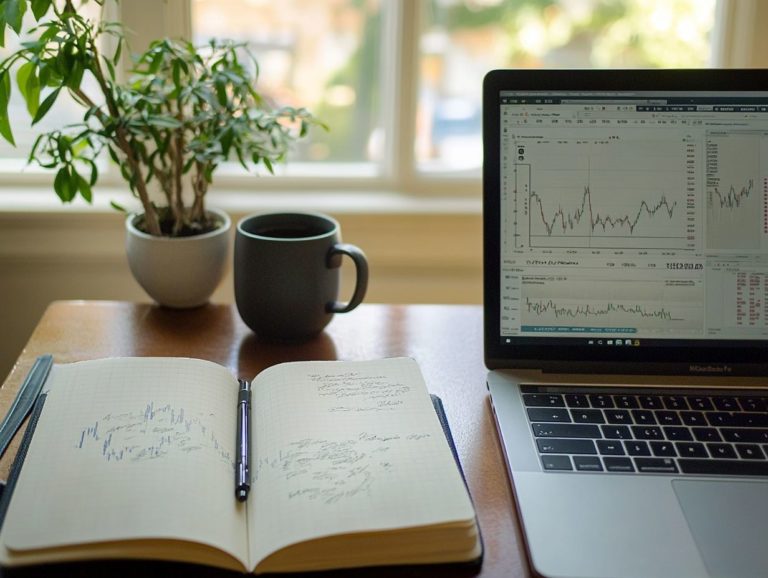How to Develop Patience as a Trader
In the fast-paced realm of trading, where split-second decisions can either create or implode fortunes, it s all too easy to let patience slip through the cracks. Cultivating this essential quality can truly transform your trading experience.
This article delves into why patience stands as a vital virtue in your trading journey, highlights the common pitfalls that often lead to impatience, and provides practical strategies to develop and sustain this critical skill.
You ll discover how discipline and emotional management intertwine to foster a patient trading mindset. Join in as you uncover the pathways to becoming a more patient and successful trader.
Contents
- Key Takeaways:
- The Importance of Patience in Trading
- Common Impatience Traps for Traders
- Practicing Patience in Trading
- The Role of Discipline in Patience
- Managing Emotions to Maintain Patience
- Frequently Asked Questions
- What are some practical ways to develop patience as a trader?
- Can having patience improve my overall trading performance?
- How can I overcome the fear of missing out (FOMO) and stay patient?
- What are some common mistakes traders make when trying to develop patience?
- How can I measure my progress in developing patience as a trader?
- Are there any other benefits to developing patience as a trader?
Key Takeaways:

- Patience is crucial in trading to avoid impulsive decisions and increase success rates.
- Identify and avoid impatience traps such as chasing profits and FOMO.
- Develop discipline and use strategies like setting realistic goals and using stop-loss orders to cultivate patience.
The Importance of Patience in Trading
The significance of patience in trading cannot be overstated; it stands as a cornerstone for achieving long-term success in the markets.
When you embrace patience, you not only adeptly navigate the complexities of market fluctuations but also cultivate superior emotional control and risk management strategies.
Understand that profitable trades take time. This understanding helps you create effective trading plans and leverage high-probability setups. This approach ultimately enhances your performance metrics and positions you for success at your trading desk.
Why Patience is a Virtue in Trading
Patience is often hailed as a virtue in trading, and for good reason it gives you the power to make informed decisions and enhances your overall performance in the financial markets.
When navigating the unpredictable landscape of stocks and currencies, your ability to maintain composure often sets you apart from those who stumble. Take dollar-cost averaging, a strategy where you invest a fixed amount regularly, reducing the impact of market fluctuations. It enables you to weather short-term volatility, paving the way for potential gains.
If you adopt trend-following strategies, you ll understand that waiting for the right moment to enter or exit a trade can be incredibly rewarding. Seasoned investors who held their positions during market downturns often enjoy the fruits of their patience when the market rebounds.
By cultivating patience, you ll learn to control your emotions better, steering clear of impulsive actions that could undermine your well-crafted strategies.
Common Impatience Traps for Traders
Impatience is often a trader’s greatest adversary, frequently resulting in impulsive decisions that can jeopardize your trading success and compromise your overall performance metrics.

Identifying and avoiding impatience in trading is crucial for effective decision-making and maintaining a disciplined approach to risk management.
When you let impatience dictate your actions, you often find yourself making hasty decisions, entering trades before the time is right, or exiting positions far too soon. These impulsive behaviors can lead to significant losses and cause you to overlook valuable opportunities.
Recognizing the signs of impatience requires self-awareness. Pay attention to your emotional triggers and how you respond to market volatility. Cultivating discipline can be achieved by establishing clear trading plans, setting realistic goals, and incorporating mindfulness techniques into your routine.
Understanding the psychological aspects of risk management is vital for developing emotional resilience, allowing you to remain focused and make calculated decisions, even amidst market turbulence.
Practicing Patience in Trading
Practicing patience in trading is essential for cultivating a resilient trader mindset. By learning how to develop a winning trading mindset, you can employ various strategies that greatly enhance this critical element of trader psychology, allowing you to navigate the markets with confidence and composure.
Strategies for Developing Patience
Developing patience in trading requires implementing specific strategies that enhance your emotional control and promote disciplined practices.
By setting realistic trade expectations, you can align your goals with market conditions, effectively reducing frustration and impulsiveness. Visualizations can also play a vital role, helping you envision your pathways to success and reinforcing a calm mindset.
Effective trading strategies are essential in this process, providing a structured approach that encourages thoughtful decision-making instead of reactionary moves.
Maintaining a consistent trading plan not only fosters discipline but also nurtures a patient mindset, allowing you to navigate the inevitable ups and downs of market fluctuations with a steady hand.
The Role of Discipline in Patience
Discipline is essential for developing patience in your trading journey. It gives you the power to stick to your trading plans and resist the temptations of impulsive decisions that can derail your strategy.
How Discipline Leads to Patience

Discipline is the backbone of successful trading, playing a crucial role in your ability to maintain patience in the face of emotional challenges.
When you develop discipline, you empower yourself to handle emotional challenges that can often derail your strategies. This vital trait enables you to stick closely to risk management rules and trading methods, minimizing impulsive decisions driven by fear or greed.
To strengthen your discipline, consider establishing a structured trading plan that clearly outlines your specific goals, risk parameters, and rules for entering and exiting the market. Incorporating daily routines like journaling your trades to reflect on your decision-making processes can significantly enhance your self-awareness.
Embracing patience allows you to wait for the right opportunities instead of rushing into trades under uncertain conditions.
Managing Emotions to Maintain Patience
Managing your emotions is key to mastering patience in trading, as emotional fluctuations can significantly impact your decision-making processes.
By honing this skill, you position yourself to navigate the complexities of the market with a clear and focused mindset.
Emotional Triggers and Coping Mechanisms
Understanding emotional triggers is crucial for you as a trader if you want to develop effective coping mechanisms and maintain discipline in your trading approach.
By identifying these triggers, you can start to recognize the patterns in your emotional responses whether it’s anxiety during a drawdown or a surge of overconfidence after a win. This awareness is a vital step toward cultivating patience, enabling you to stay focused on your long-term strategies instead of being swayed by fleeting feelings.
Employing coping strategies such as mindfulness and journaling can help you mitigate impulsive behaviors, fostering a mindset where discipline truly thrives. Ultimately, as you enhance your emotional intelligence, you ll be better equipped to navigate market fluctuations with a steadier hand, reflecting a stronger and more resilient trading psychology.
Frequently Asked Questions
What are some practical ways to develop patience as a trader?

- Set realistic goals: Having clear and achievable goals can help you stay patient during times of uncertainty or market fluctuations.
- Practice mindfulness: Take the time to reflect on your thoughts and emotions before making any trading decisions. This can help you avoid impulsive actions.
- Maintain a trading journal: This can help you track your progress and reflect on mistakes, allowing you to learn from them and become more patient in your approach.
Can having patience improve my overall trading performance?
Yes, having patience can greatly improve your trading performance. It allows you to wait for the right opportunities and make well-thought-out decisions, leading to more profitable trades.
Don t miss out on the chance to refine your patience and enhance your trading success today!
How can I overcome the fear of missing out (FOMO) and stay patient?
-
Stick to your trading plan. A solid trading plan helps you focus on your goals and avoid FOMO.
-
Focus on long-term goals. Remind yourself of your long-term objectives to resist the urge for quick trades.
-
Take breaks. Stepping away from the market can help you relax and avoid FOMO-induced actions.
What are some common mistakes traders make when trying to develop patience?
-
Overtrading can lead to unnecessary losses. Forcing trades out of impatience rarely pays off.
-
Not managing emotions is a big mistake. Impatience often stems from fear and greed, so managing these feelings is crucial.
-
Comparing yourself to others can be detrimental. Every trader’s journey is unique, and comparisons can lead to frustration.
How can I measure my progress in developing patience as a trader?
One effective way to measure progress is by keeping a trading journal. Track your emotions and decision-making. Set specific goals, like waiting a certain amount of time before making a trade or avoiding quick actions.
Reflect regularly on your progress to see how far you ve come in developing patience.
Are there any other benefits to developing patience as a trader?
Developing patience improves discipline and enhances your risk management skills. It also boosts confidence in your trading decisions.
Additionally, patience helps maintain a healthier work-life balance and reduces stress throughout your trading journey.
Start your trading journal today! Track your emotions and decisions to boost your progress.






